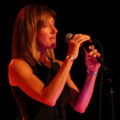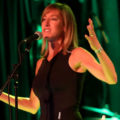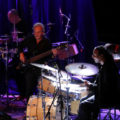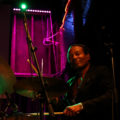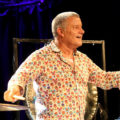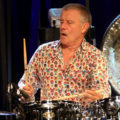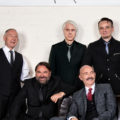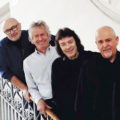Trey Gunn talks Security Project, Peter Gabriel, Progtoberfest, plus time in King Crimson
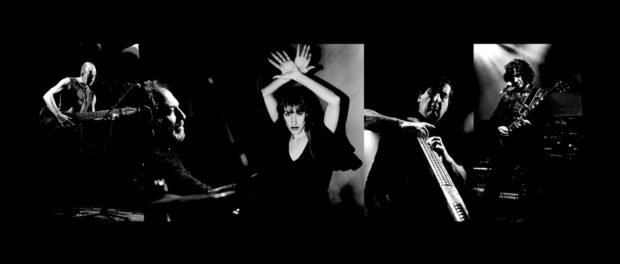 Photo provided by Glass Onyon PR
Photo provided by Glass Onyon PR
Re-imagining the music of Peter Gabriel and early Genesis is far from an easy task given the complex, intricate and unpredictable nature of the source material, but that’s exactly the kind of challenge the all-star members of The Security Project seek to conquer. Comprised of super session man/longtime Gabriel sidekick Jerry Marotta on drums, former King Crimson member/fellow session star Trey Gunn on 10-string touch guitar, previous Shriekback player Michael Cozzi on the standard six string, plus acclaimed keyboardist/eigenharpist David Jameson, the group’s earned nothing but praise from fans, critics and many like-minded artists for their endlessly interesting “Live 1” and “Live 2” albums.
In fact, the band just got back on the road in support of that recently released sequel with newly added guest singer Happy Rhodes and her astounding four-octave range, promising an even heartier sampling of the double Rock and Roll Hall of Fame inductee’s catalogue, alongside some of their personal surprises. Here’s more from Gunn, a legendary musician in his own right and mastermind behind the band’s multi-faceted record label 7d Media, as The Security Project sets its sights on headlining the Saturday, October 22 installment of Progtoberfest II at Reggie’s.
Sometimes we’re changing the arrangement and the sounds and the approach and it takes a lot of fiddling with to figure out how we’re gonna make it work, because for us, just emulating and just redoing what he did doesn’t fit us.
You switched from Brian Cummings singing on the album to Happy Rhodes coming out on tour. Tell us about the change and what they’ve brought to the band.
Trey Gunn: Brian actually wasn’t our first singer. We had another singer named Josh Gleason before we met Brian and both of those guys have male voices in the range of Gabriel, but they also took the approach of emulating his phrasing kind of to the “t,” [especially Brian]. With Happy, she’s obviously a woman. She has a very unusual voice and a huge range though, so she can sing as low as most guys and then way up super high. The approach is not at all with trying to do it how Peter does it. It’s really going to be more about interpreting the songs through her voice. We’re making some changes, changing keys, adding different backing vocals, playing with the arrangements to make it sound as good as it can. Where it can be better, we’ll make it better.
 When approaching “Live 1” and “Live 2,” how did you go about selecting the songs and what are your goals with these interpretations?
When approaching “Live 1” and “Live 2,” how did you go about selecting the songs and what are your goals with these interpretations?
Gunn: Both of these records are completely live recordings, so we haven’t had to go into the studio and construct the material in the studio. So the constructing process has been through the stage and actually it wasn’t our plan to ever make a record anyway. We just thought, ‘why would you listen to our record when you could have Peter’s records?’ Our plan was always to deal with the live stage, but funnily enough, as is obvious from the record, the recordings are really great and the interpretations are really fascinating and there is something there that’s not in Peter’s. It’s just a different thing.
As far as picking the material, if somebody has an interest in doing one of the songs, we just kind of try it. Everybody prepares their ideas about how they would tackle a song and then we come into the rehearsal studio and try it. Sometimes Peter’s original arrangement works and our sounds work and it’s relatively easy. Sometimes we’re changing the arrangement and the sounds and the approach and it takes a lot of fiddling with to figure out how we’re gonna make it work, because for us, just emulating and just redoing what he did doesn’t fit us. There are some pieces that we do fairly close to the original, like “I Have The Touch,” but “Here Comes The Flood,” we tore apart all over the place. It took us awhile to figure out the arrangement that brought the most drama out of the piece. So we just kind of go piece by piece and afterwards we look and put it in the set and see how it works. We have now much more material than we can use in a show, so it’s almost a question of what we don’t play. It’s so awesome to be in a band where you have so much classic material. There’s just no filler at all.
What can we except at the Progtober Fest?
Gunn: The tour begins in Milwaukee right before the Chicago show, so we’ll probably have already tried out some set lists. I mean we have about six new pieces we’re going to work in with Happy and then we’re adapting four or five quite significantly and we have some other core material we think she will just slot into. We’ll just have to see. We have maybe three hours of material now. We’re going to favor the new songs that we’ve never done before just because will draw less comparisons between the band without her and the band with her. I don’t know how long we get to play in Chicago. I think there are ten bands playing that day on two stages and we’ll definitely tailor the show to the context. People are going to have listened [to a lot of music] before us and we don’t want to blow everybody’s ears out but ease our way into something…We’re gonna be working on one of Happy’s songs and some other surprises. We are [also] going to expand out beyond Peter as we do more shows. We’ve been wanting too. It’s a little bit of a tight box just playing Peter stuff, but with Happy, we’re able to pretty much go where we want to go.

King Crimson
Gunn: Well my sister lives in Chicago, so I’m a little bias, but it’s true that Chicago has always been a real strong place, as strong as New York or San Francisco or LA as far as the kind of projects I’ve done. Crimson’s always been a big deal there. I have to say I’ve played at the Park West so many times that pretty much every Park West show sticks out in my mind. We played there with David Sylvian and Robert Fripp, Crimson played there I think with the double trio and I don’t know how we fit on that stage! We also did the four piece there and we also did one of “The ProjeKcts.” It’s certainly in my top five favorite places to play. Another is the Great American Music Hall in San Francisco, which has a similar vibe. The stages are really wide and there’s quite a bit of audience, but everyone feels real close to you.
Give us a glimpse into your decade with King Crimson.
Gunn: Well, funny enough, the time that I spent in Crimson- a ten year period- was maybe the longest running stretch of the band ever. It usually didn’t hang around that long, and in that stretch, there were kind of three big evolutions. The first one was the double trio that hadn’t been done before, at least with Crimson, which was essentially two power trios together: double drummers, double bass and double guitars. That was a giant electronic/orchestral beast to deal with! I think we all loved it and also it was very challenging because you couldn’t cut loose completely without stepping on someone else. So there was always this sense that everybody needs to be a little careful with the sound, which is a really cool thing.
And then we evolved through this whole “fraKctalised” where we fractured up into smaller groups and did two or three years of completely improvised shows with trios and quartets and kind of experimented for what would eventually become the new Crimson vocabulary. Basically we would just take these raw ideas out on stage and improvise them with not much planning at all. Pretty risky and it didn’t always work, but when it did, it was amazing. Then after that we evolved to the four piece with Pat [Mastelotto], myself, Adrian [Belew] and Robert where we kind of solidified this heavy, heavy Crimson. It kind of hearkened back to the “Red” Crimson [from 1974]. We did a bunch of shows with Tool and we were pushing in this new area, so I went through all of that.
 At the top of this year, “THRAK” was just re-issued as part of the “40th Anniversary” series. Your thoughts?
At the top of this year, “THRAK” was just re-issued as part of the “40th Anniversary” series. Your thoughts?
Gunn: Well that record was made very, very quickly. One of the things that Robert’s always been very strong about is that you don’t record the material until after it’s played live in the best case scenario. With the “THRAK” record, we did a little EP demo called “VROOOM” and then we went out on the road. We went down to Argentina for about a month doing shows before we went in to make the “THRAK” record and by then you’ve altered the idea of the pieces to their proper tempo and to their proper arrangement. With Crimson, you were tweaking the material every day, changing things, trying different things and doing a different improv. “Let’s try this and that.” After that month in Argentina, we pretty much sorted out the material, so when we went in to record “THRAK” at Peter Gabriel’s Real World Studios in England, I think we recorded the whole record in pretty much a week. We had everything done and then did fine tuning for another week, which was very quick.
Speaking of Peter, has he given an opinion on The Security Project?
Gunn: We have not heard directly from Peter, but we know that he knows.
What do you think he would say?
Gunn: If it were me, I would be flattered. I mean I’m sure it’s gotta be at least amusing to him and probably intriguing to see how we played some of the material, because keep in mind, a lot of the material we’re playing he doesn’t play anymore. And when he did, he had access to the technology at the time, but now we have access to the technology of now and we can do a lot of things that were difficult to do at the time. I’m sure it must be fascinating for him, but maybe he hasn’t heard it. I know we sent the records to his publisher.
What about any of the other Genesis guys?
Gunn: The only one that I’ve ever heard from is Steve Hackett. One of my good friends, Nick Beggs, plays bass with Steve and Michael and I went to see them play in Seattle last year. He knew about the band and was very gracious and wished us well. He’s heard some of it and thought it was great. I don’t think he’d heard the Genesis stuff at that point. We need to make sure to get him the new record that’s got a couple of Genesis tracks on it. He’s a very humble musician, which is so refreshing for a guitar player.

Photo provided by Anita Nowakca
Gunn: You know, funny enough, I was a little bit late to the scene. I wasn’t a Genesis fan when it was happening. I didn’t know about Genesis until I came in contact with Peter’s first solo records. And really it was the third record that hit me and blew my head open. So I kind of had to go backwards to Genesis and that is never quite is the same as being there at the time, so I can really only speak from the perspective of Peter. To me it seems like he’s searching for something, which automatically is interesting to me- the musicians who are not trying to make something to sell, but they’re searching and the music is kind of the artifact of that search. The guy who does that the most primo for me is John Coltrane. When you listen to one of his solos, he’s not even soloing, he’s looking for something and what’s left over is an artifact of his solos and his pieces.
Peter’s a little bit like that for me. I can hear him going through and looking for something and he doesn’t know what it is. You get “No Self Control” from the results of that. You get “Biko” from that. That’s not enough, but if you combine that with incredible players like Jerry and Tony Levin and Larry Fast, and going backwards, you look at the Genesis guys, who actually co-wrote all the Genesis material, you see these great players who are also willing to go to unusual places. I guess that’s the quality for me that they’re free enough with their instruments and the material not to be attached to “oh, a guitar sounds like this” and “this it how you play guitar.” Nah, that’s not interesting to me. What’s more interesting to me is “we have this musical idea, here’s a tool, now what can we do with it that hasn’t been done before and what am I willing to try?” That’s what’s interesting to me, and at the end of the day, whether the music’s great or not. And obviously in my opinion, it is.
The Security Project performs at Progtoberfest II at Reggie’s on Saturday, October 22. For additional details, visit ReggiesLive.com and SecurityProjectBand.com.

